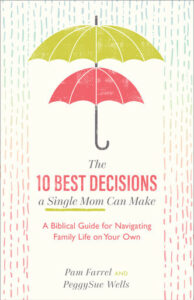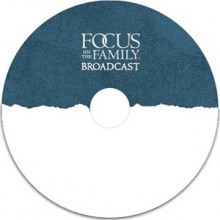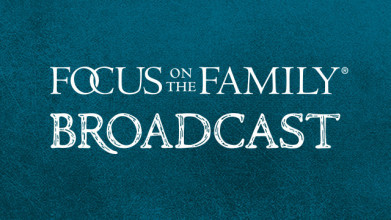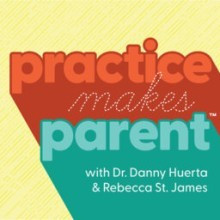Preview:
Pam Farrel: And in Psalms 27, it says, um, “He will keep me safe in His dwelling. He will hide me in the shelter of His sacred tent.” And that’s really a promise from God that He will take care of you, single mom. He will shelter you, if you give Him a chance.
End of Preview
John Fuller: That’s Pam Farrel offering encouragement for single moms and she’s with us today on Focus on the Family, along with her co-author and friend, PeggySue Wells. Thanks for joining us. I’m John Fuller and your host is Focus on the Family president and author, Jim Daly.
Jim Daly: John, did you know that one in four homes is led by a single parent?
John: I did not. That’s a staggering number.
Jim: Yeah, I think it represents somewhere around 20 million children too, so it, uh, high number of children are living in a single parent household. And, uh, man, I imagine many single parents never thought their marriages would fail, or it could be a situation where, uh, you know, a person is a widow or widower and that’s the situation they’re in. We don’t know all reasons for single parenting but circumstances happen and there it is. Uh, we want to help you. We want to come alongside you. You are doing probably the hardest job in the world, and you’re doing it with one hand tied behind your back-
John: Mm.
Jim: … and we wanna recognize that. We typically lean toward talking about a single parent mom because the predominant number of single parents are moms, uh, but we recognize that dads are there. We see you and we want you to know that. And a lot of the content we’re gonna talk about today, you can translate into your experience, so don’t feel like we’re ignoring you. Uh, we want to though help, uh, all of you, and single parent moms are the predominant structure that we see, so-
John: Mm-hmm.
Jim: … we’ll be talking about that today.
John: Yeah, we’ve got help, by the way, at the ministry, for all kinds of families, wherever you’re at. Uh, but this conversation features, as I said, Pam Farrel and PeggySue Wells. Uh, they’re both authors and speakers and Pam, uh, is married to Bill. You’ve heard them before on this show and, uh, seen them on the Focus website. PeggySue has seven children and as we’ll hear, she raised them on her own. And these two ladies have authored a book, uh, together called, The 10 Best Decisions a Single Mom Could Make: A Biblical Guide for Navigating Family Life on Your Own. Stop by focusonthefamily.com/broadcast, uh, to find your copy, or give us a call if you have any questions. Our number is 800, the letter, A, and the word FAMILY.
Jim: Pam and PeggySue, welcome to Focus.
Pam: Thanks for having us!
PeggySue Wells: Nice to be here.
Jim: Yeah, it’s so good to have ya, and-
PeggySue: Thank you.
Jim: … uh, uh, PeggySue, is this your first time on the broadcast?
PeggySue: It is, but-
Jim: Wow.
Pam: Woo-hoo!
PeggySue: … I have watched all my life (laughs).
Jim: Yeah, that’s so, so great. And we’re going to unfold your stories, but we’re already thinking sainthood for you, given that you raised seven kids on your own.
John: Mm-hmm.
Jim: We’re all going, “Ahhh!” That’s a… I mean, that right there is very amazing. Seven kids! What was the age spread of those children?
PeggySue: The oldest was graduating high school and getting ready to start her life. The youngest was a year old. And that’s when my single parent journey began, was when she was one.
Jim: Wow, that… I- I- I’m looking forward to hearing that ’cause that had to take so much resourcefulness on your part to do that. And I’m sure a lot of moms are going: “Okay, I have two kids, and she had seven. I can learn from her.” And we’ll talk about that. But let’s start with both of you just describing, um, why you created this resource, this great book, 10 Best Decisions, and how did you get to 10 Best Decisions.
PeggySue: (laughs).
Jim: I mean, I- I always wondering, did God give you a dream or what?
John: Yeah.
Pam: So, the 10 part-
Jim: (laughs).
Pam: … that’s where, um, my side comes in. PeggySue was working on a radio station, I was a frequent guest, um, there, and talked about parenting a lot, and Harvest House has our series, 10 Best Decisions a Parent Can Make, a single can make, woman can make, a man can make, okay, if I write 10 best decisions a dog can make, you just got to stop-
Jim: (laughs).
Pam: … right? But we had talked a lot about parenting off-air, not just on-air. And when I heard that she’s a single mom of seven, you know, I’m like excited to learn about PeggySue and so we had a lot of, uh, friendship conversations off-air. So then one day, PeggySue called me…
PeggySue: And I said, “Would you partner with me on writing this book?” And she said, “Oh, you need to probably just go find another single mom to write with who’s, you know, an author.” And I said, “No, Pam. I am going to pursue you.” Because Pam’s mom was a single mom, so Pam is the promise. This is not your identity. This is your experience.
Jim: Mm-hmm.
PeggySue: And you can still be fine. You know, God-
Jim: Mm-hmm. Yeah.
PeggySue: … is going to work, even in this.
Pam: Your kids might turn out… Yes, it is possible!
PeggySue: Your kids will be fine.
Jim: That’s a good place to start, Pam. Let’s, uh, turn your direction. You were the child. I was also raised in a single parent mom household, so I can-
Pam: Your story makes me cry.
Jim: … identify with you.
Pam: I like love-
Jim: Well…
Pam: … it. It’s so inspiring.
Jim: The… But in your situation, what happened? What broke apart?
Pam: Right. My… So, I’m the first-born daughter of an alcoholic dad with severe rage issues. Like I always thought that I would like make the headlines, but not for a good reason, more like man shoots family, then shoots himself. A lot of domestic violence in the home that I grew up in.
Jim: Mm.
Pam: My dad was crippled by… like emotionally, uh, handicapped and crippled, tormented by the alcohol that he had consumed since-
Jim: That’s so sad.
Pam: … he was basically a child.
Jim: Yeah.
Pam: Like alcohol runs in my family tree like sap. It goes back many generations. And so my mom, she tried her best to hang in there and make the marriage work, um, for quite a while. Uh, and in then in my high school years, things started getting worse and worse. And my mom was kind of a functional single mom, most of my childhood just because my dad traveled for work, so he was gone five days and only home on the weekends. And then the weekends were scary.
Jim: Yeah.
Pam: And, um, so that’s kind of the home that I grew up in. Um, but my, my mom’s best friend, uh, she saw the cast that we were living in and when I was about seven, she invited us to come to church and there I met people who loved Jesus. And I’m like, “This is what love looks like. I want to know the author of Jesus.” So, I was eight when I made the decision to come to know Christ in a personal way and my mom was 28. So, we kind of grew up in our faith together.
Jim: Yeah.
Pam: And, um, by the time I was, um, a senior in high school, things were getting very scary and my dad, um, kept getting promoted despite… Like he was brilliant. But despite his alcoholism, he kept getting promoted in his company, so they moved, um, about the same time as I started college. And I kept getting frantic calls from my brother and sister who were younger than me. Um, like, “Should we call the police? Mom’s… Like she’s sitting in the shower, she’s been there all day. Um, she’s like has a toothbrush. She’s cleaning the grout and she’s been there for eight hours.” And, “Pam can you c- come home? Can’t you come home?” So, the, the first-born daughter in me, you know, wanted to rush home to help my mom. And, uh, so things came to like a decision point, um, because my mom had this fracture with reality that day my sister called and, um, she… My sister was wise enough to, um, call one of my mom’s friends who was in Al-Anon with her. And, um, she said, “We need to get her to the doctor.”
Jim: Yeah.
Pam: And I don’t know this doctor, but I am so grateful for this doctor who said, “And your husband may kill you.” Because he had tried to throw my mom out of the second story, sliding glass door off the patio that week. He… You can stay and your husband may kill you. You can stay and you might snap and you would kill him. Either one of those, your kids won’t have a parent, or you can stay and lose your mind, and then who would raise your kids? Or you could separate, hoping your husband will get help for his alcoholism-
Jim: Mm.
Pam: … and you can rescue your kids because it is dangerous where you live. And I’m so grateful for that doctor because my mom said, “You’re right.” And she finally got the courage to call her parents.
Jim: The other… The other component of that, as I read the book, was, uh, he also said y- you can medicate, but I’m not going to write a prescription.
Pam: Right. He would-
Jim: That is big.
Pam: … not write a prescription, yes.
Jim: Because I think too few doctors in today’s culture would refuse the medication.
Pam: Right. He’s like-
Jim: Which sobered her up.
Pam: … “You could become known… You could become numb, but you wouldn’t be a good parent then either.”
Jim: Yeah, yeah.
Pam: Like he was really watching out for us kids.
Jim: ‘Cause that was amazing, I thought.
Pam: Yeah. He’s a great doctor.
Jim: I thought that was really good. And Pam… Oh, I mean, my heart goes out to you. I mean, that oldest daughter getting that phone call. You bore all the responsibility trying to be the stable one in the household that was-
Pam: Trying to be.
Jim: …chaotic.
Pam: Yeah. (laughs).
Jim: No, I get it. I mean, I was the youngest of five, so. But that burden, you are an adult child.
Pam: Right.
Jim: That’s what that environment creates out of you.
Pam: Yes.
Jim: To which people go, “Oh, yeah, okay, so God equipped you to be an author and successful, uh, speaker with your husband.” And I remember doing some counseling with Jean and the people were like, “Oh, yeah, that’s tough life, Jim, but it gave you the tools to be CEO of Focus.”
Pam: (laughs).
Jim: Now, let’s move o- over to Jean. Jean? You know-
Pam: (laughs).
Jim: I mean, wait a minute! Wait a minute! I want some sympathy here!
Pam: (laughs).
Jim: But it, it-
Pam: Can we unpack this just a little bit more?
Jim: … it does create, you know, you have to make decisions earlier-
Pam: Yeah.
Jim: … you become either broken or responsible. And for those that are able to grow up responsibly in that. The other thing is you learn not to do what they did.
Pam: Exactly.
Jim: I’m sure that was your experience too. Mine too. I’m not going to become what my father was, who wa- was also an alcoholic.
Pam: Exactly.
Jim: So, you learned from it, if you can. If you have the wisdom. And then you have to decide how you don’t, you know, kind of carry the burden of that, too.
PeggySue: What was key about what you said is that you have to make the decision-
Jim: (laughs), yeah.
PeggySue: … not to do those patterns and that’s where part of the, the book title, 10 Best Decisions, is because a single mom and the children, when that relationship splits, it’s a trauma. And then her brain, the thinking part of the brain goes offline and we go into trauma mode. And trauma mode is fight, flight, freeze, or please. And you’re in that, so you’re reacting, you’re not responding. And so there’s no way to like get out of that except to have someone either help you or walk through some steps or something where you can finally trigger your brain to come back online and start thinking again. And so with the book, we said: “Let’s take you through some very important steps. Follow these. Walk with us. And then as you go through this, pretty soon you’re going to be thinking again, and you’ll be able to make those decisions.”
Jim: Yeah.
PeggySue: Because that’s a lot of times, you’ll look at a single mom, you’re watching her wife- life, you’re watching her behavior and you’re like, “What is she thinking?” And then you see the children that are down at their principal’s office on a regular basis because of their behavior and everybody saying, “What are they thinking?” And it’s because they’re not thinking. It’s impossible. They can’t. They’re in trauma brain. And so she’s reacting and children, the only way they can show they have a broken heart is through their behavior. And so they’re not bad kids, they’re kids with a broken heart.
Jim: That’s a very good point. Uh, I think this is good for the listeners and the viewers to connect with where you’re coming from and so I appreciate that vulnerability, Pam.
PeggySue: Yeah.
Jim: PeggySue, uh, you have a different story in this single motherhood journey. Describe what happened with you and your husband, how old were the kids, what was going on?
PeggySue: Yeah, the oldest was graduating high school and the youngest was a year old. And it was kind of the same thing where there’d been a lot of travel in the career. So, there’d be times where, you know, it was just me and the kids, motoring along, doing fine. And then, you know, he would come home for a while, and then he’d be gone again. And we just kind of like had like that for a while. And then things just began to escalate. And as they began escalating, it finally reached a point where I had to say, you know, we just all gathered together in the family room, and I said, “You know, this isn’t a good situation. You know, it’s not good for our kids to see that this is how adults interact. It’s not good for us to, you know, have that this is what family looks like. It’s damaging. So, we have to make a decision. We have to decide if we’re going to make some shifts here, or we have to decide, I have to put some boundaries up, that this has to be safe for the family.” And so everybody got to make a choice. And, you know, people do what they do for their own reasons. I think it has everything to do with me. The truth is it really… We do what we do for our own reasons and they make choices based on what we… what we have to do internally. And interestingly, that choice, even though they’re making it because of their own reasons, it can have a Grand Canyon size impact on the people around you based on the choices. But yeah, he chose out, you know, and that was his choice, and we have, have done our best with what we had.
Jim: Describe that, uh… So, again, husbands can better understand what took place there. I mean, y- you two talked about it.
PeggySue: Mm-hmm.
Jim: You were trying to be adult about it.
PeggySue: Oh, we did so much counseling.
Jim: Yeah.
PeggySue: We tried. All the counseling. All the books. All the prayers. All the fasting. All the mentoring. I mean, we really worked hard. I know when it was… It was at the end where I’m like, “There is nothing more that I know of, that I could do physically, emotionally, spiritually.” I- I’ve, I’ve done all the things that I can possibly know to do.
Jim: And his point was it’s too hard. I’m done.
PeggySue: Mm-hmm.
Jim: I’m checking out.
PeggySue: Mm-hmm.
Jim: I… You know, again, being the person I am, the place I came from, I can’t believe a man would leave you with seven kids. I mean, that’s-
PeggySue: It’s one of those-
Jim: … that’s rough.
PeggySue: … but it’s also what is their experience and what are they working through, you see what I’m saying? So, I can’t-
Jim: Yeah, I get that, but as a man-
PeggySue: Yeah.
Jim: … uh-uh.
PeggySue: (laughs).
Pam: (laughs).
Jim: Sorry. It’s still you’re leaving your wife, even if you’re not getting along, but you’re leaving seven kids. That, that’s almost an insurmountable mountain for you and the kids.
Pam: And we do-
Jim: I’m sorry just to be that rough on that, but-
Pam: No, but we do pray that men will rise up-
Jim: … it just like, “Wow!”
Pam: … and do what you said and not walk out.
Jim: Yeah. Well, and again-
Pam: That we do pray.
Jim: … I so appreciate your tenderness and, you know, I’m sure we all have family of origin issues, but at some point-
Pam: Exactly.
Jim: … as believers, we gotta say, “Okay, we’re going to break those chains.” I know I’m coming across as a little cold, but it really irks me that we don’t live up to what we profess and, you know, we need to. I think if the church acted more Christ-like, we’d have greater healing in our families and men particularly. It needs to start with us, as leaders, to do the things we need to do, even out of obligation. That’s okay. That’s a good call.
PeggySue: Right.
Jim: But okay, so he left. What do you do day one? How do you get your kids together and go, “All right, everybody, here’s what’s happening.” That’s… I mean, one year old up to a senior in high school, that’s a broad spectrum of an explanation.
PeggySue: It breaks everyone’s heart. Everyone just has a broken heart. Everybody feels betrayed. One of my… One of my kids said, “Everything I thought was true about our family was a lie.” And I kind of had to go back and say, “It wasn’t all a lie, but I understand that’s the level of betrayal”-
Jim: Yeah.
PeggySue: … “that you feel from someone that you think is going to stay with you and be there all the time.” So, yeah, so we had to work through that. And I have adult kids that are functioning, contributing part of society. I’m just so proud of them. I’d like to say that I had good material to work with. They’re doing well. But they will always have a broken heart.
Jim: Yeah.
PeggySue: And like you said, you know, about things that we’ve gone through, sometimes it’s like we’ve got to leverage this either as a tool to move forward or we can drowned in it.
Jim: Well, and I… Yeah, I applaud you giving the kids that kind of, uh, path. You know, the Lord certainly sets the path, but a good parent in this kind of situation, and in your case, a good mom, which was my story with a good mom, uh, laying the foundation that the Lord could use to build on. That’s not easy, but it’s doable.
Pam: It is. And you know I want to give my mom credit. She’s like my hero.
Jim: Yeah.
Pam: Because she went from that broken place to like seeking Jesus with her whole heart. And when I began a friendship with PeggySue, I saw her as a hero. I mean, seven kids! Wow! And she’s an amazing mom. And so we thought through what are those decisions, what are those smart decisions that PeggySue made, that my mom made that gave our kids, that gave me, and then PeggySue’s kids that headstart-
Jim: Yeah.
Pam: … that ability to heal, the ability to move forward in life. And on the front cover of, um, 10 Best Decisions a Single Could Make, there’s two umbrellas and people are like, “Why do you have umbrellas on there?”
Jim: And they’re not even pink and blue.
Pam: Right?! (laughs).
Jim: (laughs). They’re olive and red.
Pam: Right. (laughs). And they really… The top umbrella is that God is our shelter and in Psalms 27 it says, um, “He will keep me safe in His dwelling. He will hide me in the shelter of His sacred tent.” And that’s really a promise from God, that He will take of you single mom. He will shelter you if you give Him a chance. And then, um, the second umbrella is the single mom and the promise that He will send showers of blessing. That’s what we pray, that as a result of the contents, of 10 Best Decisions a Single Can- Single Mom Can Make, that those decisions, those choices will become a life that God can bless; her, the kids, their future.
John: And this Focus on the Family with Jim Daly. You’re hearing from the heart, uh, our guests are Pam Farrel and PeggySue Wells, and, uh, we’re so glad to have them and to uncover these topics. Uh, this is so important and this book is a terrific resource, The 10 Best Decisions a Single Mom Can Make. As Jim said at the beginning of the show, these are principals that any parent can apply, dads too. Uh, contact us for a copy today. Uh, our number is 800, the letter, A, and the word, FAMILY. And we have details at focusonthefamily.com/broadcast.
Jim: And again, I just want to say this ’cause we’ll hear from the single parent dads. We know you’re there and, uh, the shoe is probably on the other foot. It was your spouse perhaps that said, “I’m done”, and left you with the kids. And, and we get that, so apply the principals and, uh, we know this applies to you too and you also have one arm tied behind your back-
John: Mm-hmm.
Jim: … and we get that. Um, let me go to both of you. What are the dangers of stuffing emotions when you’re going through this kind of hardship like a divorce or separation? I- I- I mean, it’s easy to do. Let’s not talk about it in front of the kids, uh, let’s… And of course, the kids, as a kid, in that situation and Pam, I’ll ask you first, I- it-… you know something is not right as that child. I mean, it happened to me when I was five and I could tell something-
Pam: Right.
Jim: … wasn’t right. And all of sudden, Dad wasn’t around much or at all, uh, but you didn’t feel like you could say, “Uh, where, where’s Dad?” ‘Cause there was something wrong about talking about it. Does that make sense?
Pam: It does. I think that harder part, um, for my mom and I because I was older-
Jim: Yeah.
Pam: … I became like a confidante, uh, to my mom and… But she was wise enough to realize, “Oh, my goodness, Pam shouldn’t have to be my counselor. I need to get a good counselor”-
Jim: Yeah.
Pam: … “I need to go talk to my pastor. I need to find a Christian counselor.” So, that was one of her first best decisions that she made is she surrounded herself with a support system, um, other single parents that had moved forward in life. And so she, she made a lot of decisions very quickly; um, moving us out… Well, she moved us out of California, back home to where to her, um, parents lived, and so-
Jim: Oh, so you had support.
Pam: … we lived right… Yes.
Jim: Yeah.
Pam: But right down the street-
Jim: That’s good.
Pam: … from wonderful grandparents. Um, and we went there a lot because they were stable and encouraging and grandpa was like a male, um, role model-
Jim: Sure.
Pam: … for my brothers especially.
Jim: Healthy.
Pam: Yeah. And so there was some good decisions that she made quickly and sometimes that’s really tough to do because you’re selling the house, you’re like splitting finances, there’s lawyers, it’s a lot. And so we always encourage, um, single moms like, “Don’t go through it alone.” When Bill and I were pastoring, um, we had a two-step process. And so, uh, a woman would come, you know, in for counseling or the couple may have been counseling with Bill and then, you know, the guy opts out. Um, we get the single mom in a room with her best friends from the church, they’re healthy, and, um, her family may be from the area, and we say: “Okay, we need a crisis plan; six to eight weeks. And then we’ll work on the long-term plan to move you and your kids forward.”
Jim: Wow, that’s so healthy. Wow. PeggySue, uh, from a mom’s perspective, that stuffing of the emotions… I mean, some of that what Pam is describing is wisdom, so it’s not like completely healthy to just unload.
PeggySue: And it’s like you said, it’s not ideal. The situation’s not ideal, but it is our real.
Jim: (laughs), yeah.
PeggySue: So, we have to deal with our real. And one of the things that was really important was to be able to still have those feelings ’cause I lived through a place of, “This just hurts too much. I’m just going to shut it all down.” But they’re like grapes. You know our emotions are like grapes, so if I shut that down, then I don’t have the love, the joy, and the happiness that goes with it. So, you have to be bold and courageous and brave enough to feel all the feelings ’cause that’s what makes us human. And so I would… We made some rules in our home because everybody was in a different stage at a different time. So, somebody would be fine, somebody else would be just-
Jim: Ah.
PeggySue: … terrible, somebody else would be angry, somebody else would think it was, you know, everything was good, and somebody else would be like, you know, worst day ever. So, we kind of had to put some ground rules which said, “You can feel what you feel and we want you to feel it, however, you cannot take it out on someone else and you also cannot demand that, that person can change how they feel.” So, feel your feelings, but it cannot come out on others and you… we will honor you. This is where you are right now.
Jim: Wow.
PeggySue: And that’s where you are right now.
Jim: Yeah.
PeggySue: And it’s going to shift.
Jim: I would think that really helped the kids regulate their emotions-
PeggySue: ‘Cause it-
Jim: … I mean, in a healthy way. Not to stuff them down, but to release them appropriately.
PeggySue: ‘Cause we need to be able to feel them-
Jim: Yeah.
PeggySue: … in order to be whole and healthy. And then to be whole and healthy for our relationships that we will be involved in and that we’re involved with now.
Jim: Yeah, that’s really good. Let- Let’s turn a little corner and talk about elements of fun in a, you know, in an environment that easily says, “Hey, why are you having fun? There’s nothing to have fun about here.”
PeggySue: We had not smiled for a while and I realized it one time when I’m like, “Okay, life has to keep going. I can’t just crumble,” even though I felt like it. And one of my daughters needed to get her driver’s license. And so I’m like, “Okay, I’ve got to get her parallel parking, so we can, you know, finish this permit and she can get the license. I have to move forward.” So, I said to the kids, “Okay, I’m, I’m going to take her driving to- for practice.” And everybody else was like, “We’re coming!” And they all pile into our nine pass-… or our 12-passenger van, so we’re all in there. And she… The reason they came was because she’s really spastic and so we’re like, you know, jerking in the car-
Pam: (laughs).
PeggySue: … and almost crashing into things, and we laughed. We started laughing and laughing and laughing and in that moment, I realized my face hadn’t laughed in months. I mean, just-
Jim: You hurt. Your cheeks hurt.
PeggySue: Yeah, it hurt. And then we were laughing so hard that, you know, there was people that, you know, maybe wet their pants. I’m not naming names, but-
Pam: (laughs).
PeggySue: … it was good fun. And I since realized that fun is part of helping everybody to be able to have a healthy life. And then one of the other ways we did that was, um… We would go visit places. We needed to get away from our home and realize that our problems were this big, but the world is this big, and God is this big.
Jim: Mm-hmm.
PeggySue: And so it put things back in perspective.
Jim: Yeah.
PeggySue: And so each of the kids, I would say to them, “What is your interest? What do you want to do?” And so somebody wanted to raise animals, and somebody wanted to play music, and somebody wanted to be in the Civil Air Patrol. And so everybody… We, we sent them to all their things so that they could develop and they could have fun with other people and they could laugh with them. And, and then we would also watch a comedy video every so often. Like if we hadn’t laughed in a while, there was, uh, every Friday night, there was a comedy video on. And now my family speaks to each other in video quotes.
Pam: (laughs).
PeggySue: You know movie quotes?
John: (laughs).
Jim: (laughs).
PeggySue: Movie quotes and book quotes. We had to laugh. And it was very, very healthy.
Jim: Nah, that’s so good. Hey, in the book, and we’re right at the end here, so let’s come back for another day and keep this discussion going if you can.
PeggySue: I’d love to.
Jim: But right at the end, uh, maybe to tease this up for next time; in the book, you talk about five roots of conflict that break out in family. Let’s just list the five and describe them briefly.
PeggySue: They are rejection, resentment, resistance, revenge, and repeat.
Jim: Yeah. And which one stands out for you? Not that there’s a favorite in that category ’cause they’re all pretty negative, but-
PeggySue: It all starts with rejection.
Jim: Yeah.
PeggySue: It all starts… That is the beginning of the five R parade is when I feel rejected, and then I go through the rest of the Rs and then we have damage to a relationship.
Jim: Well, why don’t we pick up there next time and we’ll go through those a little more slowly and explore them. Can we do that?
PeggySue: Yeah.
Jim: All right.
Pam: Fabulous.
Jim: All right. This has been good and what a good kickoff. Thanks for your vulnerability and being honest. Uh, I think the Lord loves those things that we bring to the light and I think other people feel connected when, uh, they know you’re not you’re perfect (laughs).
Pam: (laughs).
Jim: I haven’t met that perfect person yet. Have you?
John: Not in the least, yeah.
Jim: So, we so appreciate you being with us today. Thank you. And if this is touching a cord with you, like our two guests, maybe you were the child in a situation where, uh, the parents split and you had to live; um, that’s your story. Or you’re the spouse and you’re, uh, spouse departed from you either, you know, through a breakup or maybe in a different way. Um, we want to get this resource into your hands, so we can make you the most powerful single parent you can be. And again, we lean into the mother’s side of the story because that’s the dominant number of single parents are moms. So, get in touch with us. Let us help you. Oftentimes, uh, we hear we don’t have enough at Focus on the Family to help single parents. Well, here you go. We’re listening. And that’s one of the reasons we brought our two wonderful guests in to talk about this subject. And a great way to do that, uh, is to contact Focus on the Family. John will give you those details in a minute and get your copy of the book. And, uh, we’ll do it easily if you can make a gift of any amount, if you can do it monthly, that’s great, a one-time gift is good. We also know a single parent’s budget is tight. If you can’t afford it, we’re a ministry; we’ll want to get it into your hands. We’ll trust others will cover the cost of that. So, don’t be embarrassed, just give us a call and let us get you this great resource.
John: Mm-hmm, yeah, donate as you can. And as Jim said, if you can’t, uh, still g- get in touch with us. Let us help you, uh, by sending a copy of this book, The 10 Best Decisions a Single Mom Can Make. Uh, we’ve got details for, uh, resources like, uh, this book and ways to donate online at focusonthefamily.com/broadcast. And let me just say we’ve touched on some tender topics today and if you’re struggling and you don’t know where to start, if a book isn’t quite enough for what you’re dealing with, uh, we have caring Christian counselors here. Our donor team makes it possible for us to have a counselor, give you a call back, they’ll hear you out, they’ll listen to you, pray with you, and point you to some further steps for you to find healing in our journey. Our number again, 800, the letter, A, and the word, FAMILY. On behalf of Jim Daly and the rest of the team, thanks for joining us today for Focus on the Family. I’m John Fuller inviting you back as we continue the conversation with PeggySue and Pam and once again help you and your family thrive in Christ.




















